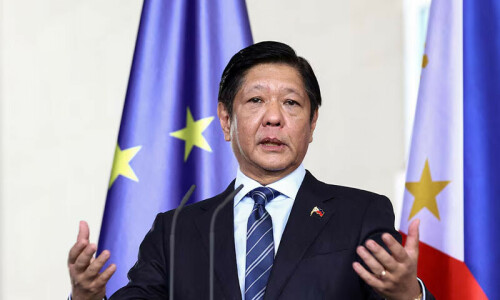SINGAPORE: The US and Chinese defence chiefs locked horns on Taiwan in their first face-to-face meeting in two years on Friday, while Philippines President Ferdinand Marcos Jr slammed “illegal, coercive actions” in the South China Sea, a clear censure of Beijing.
The exchanges at the Shangri-La Dialogue in Singapore, Asia’s biggest defence forum, came amid reports that Ukrainian President Volodymyr Zelensky would fly in to attend the meeting on Saturday.
He is expected to try to drum up support for a Ukraine peace conference to be hosted by Switzerland in mid-June. Russia has not been invited and China has confirmed it will not attend.
Zelensky has urged US President Joe Biden to attend, but Washington has not confirmed who it will send.
Defence Secretary Lloyd Austin and China’s defence minister, Dong Jun, met on the sidelines of the Singapore conference earlier in the day, reiterating their differences on Taiwan and other issues, but emphasising the need to keep military-to-military communications open.
Austin expressed concern about Chinese military activity near Taiwan, including after the island’s presidential election and the inauguration of President Lai Ching-te, US Air Force Maj Gen Patrick Ryder said in a statement.
“The secretary expressed concern about recent provocative PLA activity around the Taiwan Strait, and he reiterated that the PRC should not use Taiwan’s political transition — part of a normal, routine democratic process — as a pretext for coercive measures,” Ryder said after the 75-minute meeting.
He was referring to the People’s Liberation Army and the People’s Republic of China.
Dong warned Austin that the US should not interfere in China’s affairs with Taiwan, defence ministry spokesperson Wu Qian told reporters.
The US approach to Taiwan violates commitments made by the United States and sends the wrong signal to “separatist forces” in Taiwan, the spokesperson quoted Dong as saying.
A senior US defence official said the meeting marked an “important step” in opening lines of communication.
The official said Austin was “firm but professional” and also brought up China’s nuclear, space and cyber developments.
The two sides also discussed the South China Sea and the conflicts in Ukraine and Gaza.
South China Sea dispute
Marcos, making a keynote address at the meeting, said that the Philippines and other Southeast Asian countries had a vision for “peace, stability, and prosperity” in the disputed South China Sea, but that this was being undermined by other actors, although he did not name China.
“Illegal, coercive, aggressive, and deceptive actions continue to violate our sovereignty, sovereign rights, and jurisdiction,” Marcos said.
Encounters between the Philippines and China in Asia’s most contested waters have grown more tense and frequent over the past year as Beijing presses its claims on shoals sitting in waters that Manila says are well within its territory.
China’s coast guard has stepped up so-called “grey-zone” activities such as the use of water cannons, collisions and ramming tactics to try to stop the Philippines from patrolling and resupplying its troops.
Published in Dawn, June 1st, 2024
















































Dear visitor, the comments section is undergoing an overhaul and will return soon.